- Home
- Karen Marie Moning
Darkfever_The Fever Series Page 14
Darkfever_The Fever Series Read online
Page 14
The Fae stepped back.
I blinked. “Huh?”
“Not retreat, human,” it said coldly. “Impatience. I know what you are, sidhe-seer. We need not play your silly game of tag.”
“Oh right,” I snapped, “but we sure were going to take the time to play your silly game of death-by-sex, weren’t we?”
It shrugged. “I would not have killed you. You have value to us.” When it smiled at me, I went blank for a heartbeat, as if the sun had come out from behind clouds to shine down only on me, but it was so hot that it charred all my wiring. “I would have given you only the pleasure of my magnificence,” it told me, “not the pain. We can do that, you know.”
I trembled at the thought—all that heat, but no ice; all that sex, but no death. The night air felt suddenly cool on the scorching skin of my breasts, frigid to the fire of my nipples. I glanced down. My shirt and bra were lying in the gutter at my feet, mixed with the daily trash and grime of the city.
Jaw set, hands shaking, I bent to retrieve my clothing. Blushing a half-dozen shades of red, I put my bra back on and pulled my shirt over my head again. I reclaimed my paper-bag purse and my iPod from the gutter as well, jammed my ball cap back on my head, but didn’t bother fishing out my hideous glasses—I didn’t want the thing looking any larger than it already did. Then, without hesitation, I stood and lunged straight for the Fae. I had to freeze it. It was my only hope. God only knew what I might do next.
Before I was able to reach it, however, it vanished. One moment it was there, the next it was gone. I was pretty sure I’d just witnessed Fae “sifting” firsthand. But where had it gone?
“Behind you, human,” it said.
I turned sharply to find it standing on the sidewalk, a dozen feet to my left, pedestrians parting around it like the Red Sea drawing back from Moses, giving it increasingly wider berth. In fact, foot traffic on the entire street seemed to be thinning substantially and, here and there, a pub door suddenly slammed closed against a distinctly un-summery chill in the July air.
“We do not have time for fool’s play, MacKayla Lane.”
I jerked. “How do you know my name?”
“We know much about you, Null,” it said. “You are one of the most powerful sidhe-seers we’ve yet encountered. And we believe you have only begun to realize your potential.”
“Who are ‘we’?” I demanded.
“Those of us who are concerned with the future of both our worlds.”
“And who would these ‘those’ be?”
“I am V’lane, prince of the Tuatha Dé Danaan, and I am here on behalf of Aoibheal, exalted High Queen of our race. She has a task for you, sidhe-seer.”
I barely resisted the urge to burst out laughing. The last thing I’d have expected to hear from any Fae was something along the lines of: Your mission, should you choose to accept it … “Uh, on the off chance that you’ve forgotten—not that I’m trying to remind you or anything—but aren’t the Fae more inclined to kill sidhe-seers than to assign them helpful little tasks?”
“We haven’t made examples of your kind for some time now,” it said. “As a gesture of our good will and a token of the queen’s esteem, we have a gift for you,”
“Oh no.” I shook my head. “No gifts, thank you.” I was familiar with the whole Trojan-horse-beware-of-Greeks-bearing-gifts debacle and there was no doubt in my mind that a Fae bearing gifts would certainly be worse.
“It is my understanding you have betrayed yourself to one or more of the Unseelie,” it said coolly.
I stiffened. How did it know? And what did it mean by “or more”? Had the Royal Hunters been alerted too? “So?” I shrugged, falling back on my best, last defense: bluffing.
“Our gift offers you no small protection from those who would harm you.”
“Including you?” I blurted. Though I’d been managing to hold my own in conversation with it—and believe me, with what I was feeling, it was hard enough to string together consecutive words, to say nothing of trying to make them intelligible—twice now I’d had to pull my shirt back down and I’d just caught myself unzipping my jeans.
“There is no protection against one such as I, sidhe-seer. We of the royal houses affect humans in this manner. There is nothing that can be done to prevent it.”
One day I would know that for the lie it was. But not before I’d been burned by the truth in it. “Then what good is your stupid gift?” Crossly, I hooked my bra again. My breasts were so hot and tight they hurt. I cupped one in each hand, squeezed and kneaded, but my desperate massage provided no relief.
“Our gift would allow you to defend against many who would kill you,” it said, “just not against those with the right to kill you.”
My eyes narrowed and my hands dropped to my sides where they fisted. My nails gouged half-moon crescents on my palms. “The right to kill me?” I snapped. Was that what they’d thought of my sister, the ones who’d murdered her? That they’d had the right?
It studied me. “Not that any of us would.”
Yeah, right—and piranhas were vegetarians. “What is this gift?” I demanded.
The Fae extended a gold arm cuff, etched with silver, flashing with ruby fire. “The Cuff of Cruce. It was made long ago for one of his prized human concubines. It permits a shield of sorts against many Unseelie and … other unsavory things.”
“What about the Seelie? Does it work against them?”
It shook its frighteningly beautiful head.
I thought a minute. “Would it keep me safe from the Royal Hunters?” I asked.
“Yes,” it replied.
“Really?” I exclaimed. I could want it for that alone! Ever since I’d heard of the devil-like Hunters, the mere thought of them made my skin crawl, as if a special fear of that caste of Unseelie beyond all others was programmed into my much preyed upon genes. “What’s the catch?” I asked. A stupid question, I knew. As if it would tell me. I couldn’t trust a thing it said. I’d not forgotten Barrons’ comment that Seelie and Unseelie royalty were nearly impossible to tell apart. Though this Prince V’lane of the Tuatha Dé Danaan claimed to be here on the Seelie Queen’s behalf, I had no proof of that, nor even that it was who and what it claimed to be.
“There is no catch,” it said.
Like I said, stupid question. “I stand with my initial position,” I informed it. “No thank you. There, that’s done. Now let’s get to the point: What do you want from me?” I yanked my shirt back down. I wanted our little job-offer interview over and done with, the sooner the better.
The air around me chilled, as if iced by the Fae’s displeasure with my attitude. “There is trouble in Faery, sidhe-seer,” it said, “and as you have seen, in your world, as well. After an eternity of confinement, some of the lower-caste Unseelie have begun escaping their prison. Despite our efforts to isolate the weakness in the fabric of our realms, we have not been able to determine how they are breaking free.”
I shrugged. “So, what do you want me to do about it?”
“Queen Aoibheal wants the Sinsar Dubh, sidhe-seer.”
I was beginning to think it might be easier to start tallying everyone I knew in Dublin that didn’t want the Sinsar Dubh. Gee, that would be nobody. “Well, what’s stopping her from getting it? Isn’t she supposed to be the most powerful of all the Fae?” I was pretty sure that was what Barrons had told me. Except for the Unseelie King, who some claimed outranked all, while others contended he was a mere figurehead, that the “children of the goddess Danu” were a matriarchal line. According to Barrons, nobody really knew anything for sure about the Unseelie King.
“We have a small difficulty. We are unable to sense our own sacred objects. It is only the rare sidhe-seer who can. We do not know where it is.” The Fae could not have seemed more affronted by its admission. How dare the world not bow and scrape at its feet? How dare the universe not conspire to arrange everything in its favor? How dare a mere human possess an ability that was beyond theirs? “Other
things have gone missing, as well, that we would like to recover.”
“And just what does she want me to do about it?” I didn’t like where things seemed to be going. I wasn’t certain I could survive it.
“She merely wishes you to continue searching as you have been and from time to time we will check on your progress. Should you learn anything—however small—about any of our hallowed relics, especially the Sinsar Dubh, you will alert me immediately.”
I sighed with relief. I’d been afraid it was planning to stay around while I searched. Thank God, it wasn’t. “How am I supposed to do that?”
Again, it offered me the Cuff of Cruce. “With this. I will show you how to use it.”
I shook my head. “I’m not taking it.”
“Don’t be a fool. Your world is suffering, too.”
“I have only your word for any of this,” I said. “For all I know, you’re lying about everything and that cuff might just kill me the instant I put it on.”
“By the time you find proof that satisfies you, sidhe-seer,” it said coldly, “it may well be too late for your race.”
“That’s not my problem,” I retorted. “I never wanted to be a sidhe-seer and I’m not even admitting that I am one now.” In college, I’d known a few people with superhero aspirations, who’d wanted to make a difference: join the Peace Corps, or become doctors and cut people open so they could fix them and sew them back up again, but personally, I’d never had any desire to save the world. Decorate it? Yes. Save it? No. Until a short time ago, I’d been a small-town girl with small-town dreams and perfectly content with my lot in life. Then someone had crapped on my world and forced me out of my happy little hole. I’d come to Dublin with a single purpose at heart: to avenge my sister’s death. Then and only then could I return to Ashford with some kind of closure for Mom and Dad. Then maybe we could heal, and try to be a family again. That was the only world I cared about saving—mine.
“You will change your mind,” it said.
The Fae was gone.
I stared blankly for several moments at the space it had been occupying, before snapping out of it. Despite the recent horrors I’d witnessed, I wasn’t in the least inured, and watching something vanish right before my eyes had been profoundly disturbing.
I glanced around to make sure it hadn’t popped back in behind me to sneak up on me or anything like that, but I was alone on the street. I was startled to realize the temperature in my immediate vicinity had dropped so significantly that I could see my breath in the air. A thin perimeter of fog encased me some twenty feet away, where iced air met heat again. I would soon learn it was characteristic of royalty; their pleasure or displeasure often reshaped the environment in small ways around them.
I did another quick scan. Yes, the street was empty, all the doors were closed, and there wasn’t a soul around.
As fiercely ashamed of myself as I was aroused, I slipped a hand down my jeans.
I came the moment I touched myself.
FOURTEEN
It was a quarter past eight by the time I made it back to the bookstore. I knew Barrons was there as soon as I turned the corner. His big black-and-chrome hog was parked outside the brilliantly spotlighted front, playing kissing cousins with Fiona’s sedate sedan.
I rolled my eyes. My day continued to cruise downhill. I’d been hoping that Fiona had left on time, before Barrons had arrived, and before she could rat me out.
No such luck.
I detoured around back, deciding I would sneak in from the rear, pretend to have been upstairs all day—with my iPod on in case anyone claimed to have knocked—and see if I could pull it off. You never knew what you could get away with until you tried. Maybe nobody had bothered checking on me.
When I rounded the rear of the building, my gaze automatically shot to the end of the alley, past the store, to the dark perimeter of the abandoned neighborhood beyond the rear floodlights. I paused, searching for shadows that shouldn’t be there. A humorless smile curved my lips; the strangest things were becoming instinctive.
I spotted four clusters of darkness that were wrong. Three clung to the shadowy eaves of a building two doors down on the right; the fourth was on my left and behaving far more boldly. It was creeping back and forth along the stone foundation of the shop directly adjacent to Barrons, shooting and retracting dark tendrils of itself, testing the edges of the pool of light flooding the rear entrances.
All four of them pulsed hungrily at my approach.
Stay to the light, Barrons had told me, and you will be safe. The Shades can only get you in full darkness. They are unable to tolerate even the smallest amount of light. You must never, Ms. Lane, ever enter the abandoned neighborhood at night.
Well, why doesn’t somebody go in there during the day and fix all those broken streetlamps? I’d asked. Wouldn’t that get rid of them? Or at least help?
The city has forgotten that section exists, he’d replied. You will not find a district of the Gardai that claims it, and if you ask city power or water they will have no record of service to any address within its bounds.
I’d snorted. Cities don’t just lose entire neighborhoods. That’s impossible.
He’d smiled faintly. In time, Ms. Lane, you will cease using that word.
As I climbed the steps to the rear door, I raised my fist and shook it angrily at the Shades. I’d had my fill of monsters for the night. The Shade that was creeping along the foundation startled me by bristling visibly back at me. I found its display of sentient hostility chilling.
The rear door was locked, but the third window I tried slid up easily. I muttered beneath my breath about Barrons’ appalling lack of safety-consciousness, as I boosted myself up and over the sill. After a quick bathroom stop, I headed for the front of Barrons Books and Baubles.
I don’t know what made me hesitate when I went to open that second door that separated residence from store, but something did. Maybe I heard my name as I was reaching for the knob, or my curiosity was piqued by the urgent undertone in Fiona’s voice that was carrying clearly through the door, although her words did not. Whatever the reason, rather than betray my presence, I nudged the door slightly ajar, pressed my ear to the crack, and displayed a dearth of manners that would have appalled every woman in my family ten generations back; I eavesdropped on the conversation taking place beyond it.
“You have no right, Jericho, and you know it!” Fiona cried.
“When will you learn, Fio?” Barrons said. “Might makes right. That’s all the right I need.”
“She doesn’t belong here. You can’t let her stay. I won’t stand for it!”
“You won’t stand for it? When did you become my keeper, Fio?” There was danger in the very gentleness with which Barrons asked the question, but Fiona either didn’t hear it, or chose not to heed it.
“When you started needing one! It’s not safe to have her here, Jericho. She must go—tonight, if possible, tomorrow at the very latest! I can’t be here all the time to make sure nothing happens!”
“No one asked you to,” Barrons said coldly.
“Well, someone needs to,” she cried.
“Jealous, Fio? It doesn’t become you.”
Fiona sucked in an audible breath. I could almost see her standing there: eyes bright with passion, two spots of color high on the cheekbones of her aging movie-star face. “If you must take this to a personal level, then yes, Jericho, I am. You know I don’t want her here. But it’s not just about me and what I want. That child is as ignorant and innocent as the day is long—”
Okay, I really resented that.
“—and she doesn’t have the slightest idea what she’s doing. She has no notion of the danger she’s in, and you have no right to continue placing her in it.”
“Not right, Fio, might. Remember? I’m not interested in rights. I never have been.”
“I don’t believe that, Jericho. I know you.”
“No, Fio, you only think you know me. You really d
on’t know me at all. Stay out of this or leave. I’m sure I can find another to”—he paused a moment as if searching for precisely the right words—“serve my needs.”
“Oh! Serve your—oh! Is that what I do? Serve your needs? You’d do that, too, wouldn’t you? Find someone else. Just pack me off on the nearest train. I bet you wouldn’t even say good-bye, would you? You’d probably never even think of me again!”
Barrons laughed softly, and although I couldn’t see either of them, I pictured him taking her by the shoulders, maybe brushing his knuckles to the pale, soft curve of her cheek. “Fio,” he said, “my foolish, sweet, faithful Fio; there will always be a place for you in my thoughts. But I am not the man you believe me to be. You have romanticized me unforgivably.”
“I have never seen any more in you than I know you could be, if you wanted to, Jericho,” Fiona declared fervently, and even I—a child as ignorant and innocent as the day was long, to coin a recently minted phrase—could hear the blind conviction of love in her voice.
Barrons laughed again. “And there, my dear Fio, you make one of Womankind’s greatest mistakes: falling in love with a man’s potential. We so rarely share the same view of it, and even more rarely care to achieve it. Stop pining for the man you think I could be—and take a good, long, hard look at the one I am.” In my mind, Barrons grabbed her when he emphasized the word “look” and was now shaking her, not quite so gently.
There was another silence, then a sharp, pained feminine gasp, and a much longer silence.
“She stays, Fio,” Barrons murmured after some time. “And you will keep your peace about it, won’t you?”
I was beginning to think I’d missed her reply when Barrons spoke again, harshly. “I said ‘won’t you,’ Fio?”
“Of course, Jericho,” Fiona replied softly. “Whatever you wish.” Her voice was dreamy, as carefree as a child’s.
Taken aback by her sudden, drastic change of heart, I closed the door with careful stealth.
Then I turned and beat a hasty path for the dubious security of my borrowed bedroom.

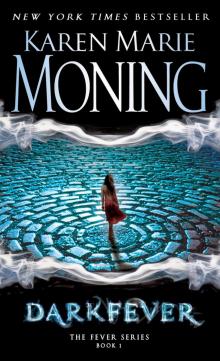 Darkfever
Darkfever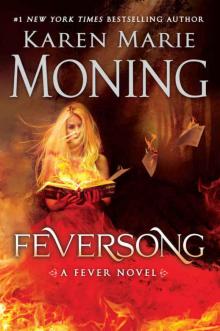 Feversong
Feversong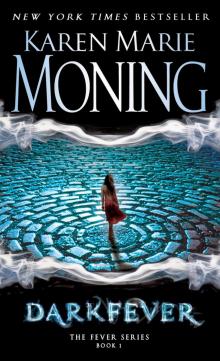 Faefever
Faefever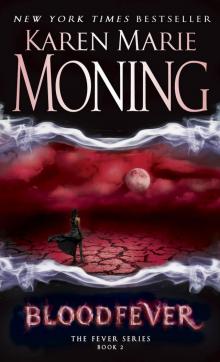 Bloodfever
Bloodfever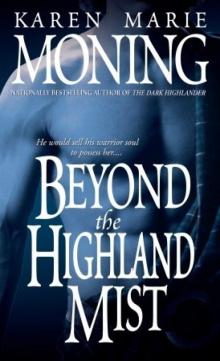 Beyond the Highland Mist
Beyond the Highland Mist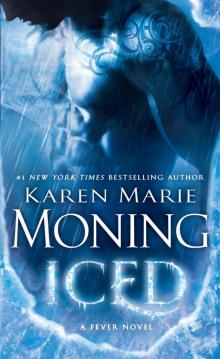 Iced
Iced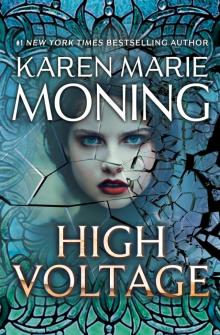 High Voltage
High Voltage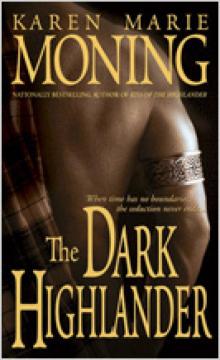 The Dark Highlander
The Dark Highlander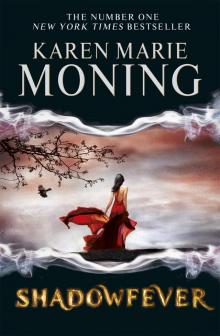 Shadowfever
Shadowfever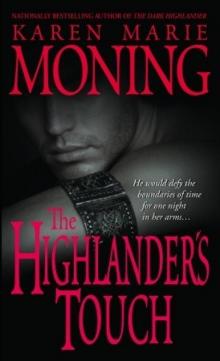 The Highlander's Touch
The Highlander's Touch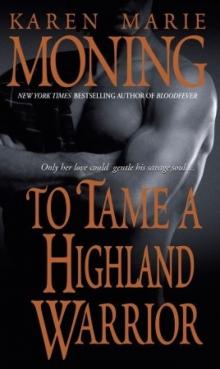 To Tame a Highland Warrior
To Tame a Highland Warrior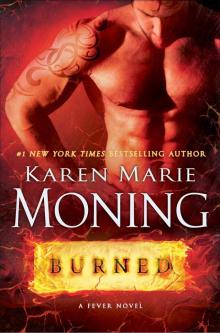 Burned
Burned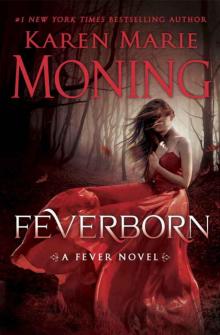 Feverborn
Feverborn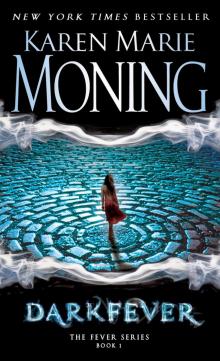 Dreamfever
Dreamfever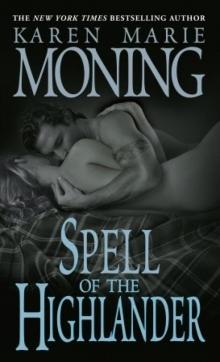 Spell of the Highlander
Spell of the Highlander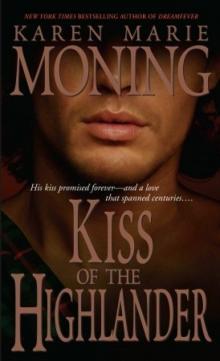 Kiss of the Highlander
Kiss of the Highlander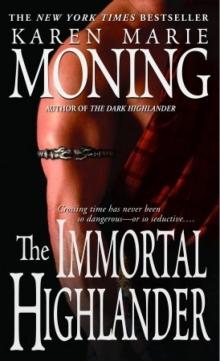 The Immortal Highlander
The Immortal Highlander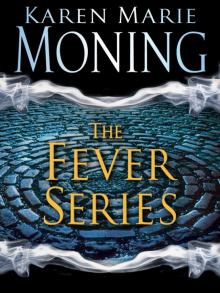 Karen Marie Moning’s Fever Series 5-Book Bundle: Darkfever, Bloodfever, Faefever, Dreamfever, Shadowfever
Karen Marie Moning’s Fever Series 5-Book Bundle: Darkfever, Bloodfever, Faefever, Dreamfever, Shadowfever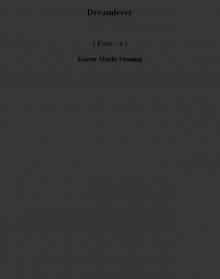 Dreamfever f-4
Dreamfever f-4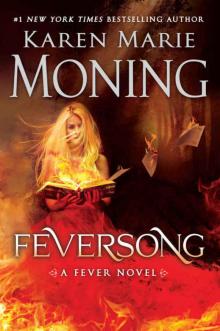 Feversong: A Fever Novel
Feversong: A Fever Novel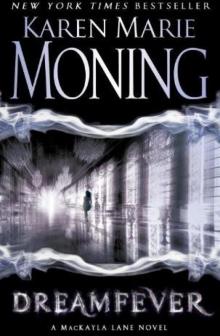 Dreamfever_The Fever Series
Dreamfever_The Fever Series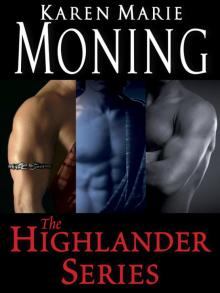 The Highlander Series 7-Book Bundle
The Highlander Series 7-Book Bundle![[Highlander 04] - Kiss of the Highlander Read online](http://i1.bookreadfree.com/i1/03/29/highlander_04_-_kiss_of_the_highlander_preview.jpg) [Highlander 04] - Kiss of the Highlander
[Highlander 04] - Kiss of the Highlander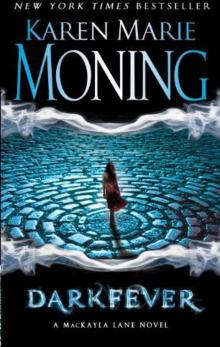 Darkfever_The Fever Series
Darkfever_The Fever Series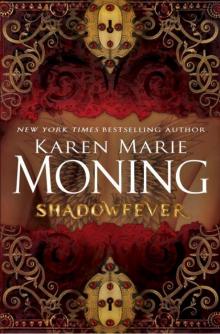 Shadowfever_Fever
Shadowfever_Fever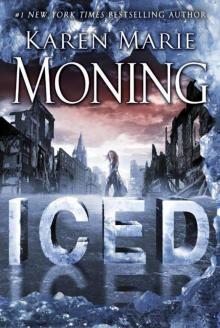 Iced: A Dani O'Malley Novel (Fever Series)
Iced: A Dani O'Malley Novel (Fever Series)![Fever [08] Feverborn Read online](http://i1.bookreadfree.com/i2/04/09/fever_08_feverborn_preview.jpg) Fever [08] Feverborn
Fever [08] Feverborn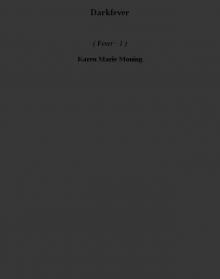 Darkfever f-1
Darkfever f-1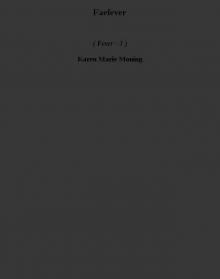 Faefever f-3
Faefever f-3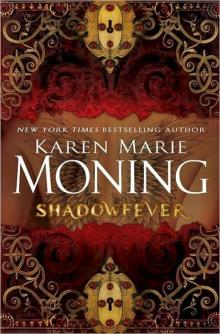 Shadowfever f-5
Shadowfever f-5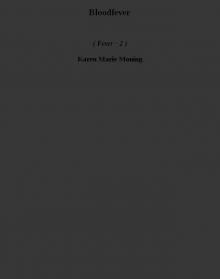 Bloodfever f-2
Bloodfever f-2